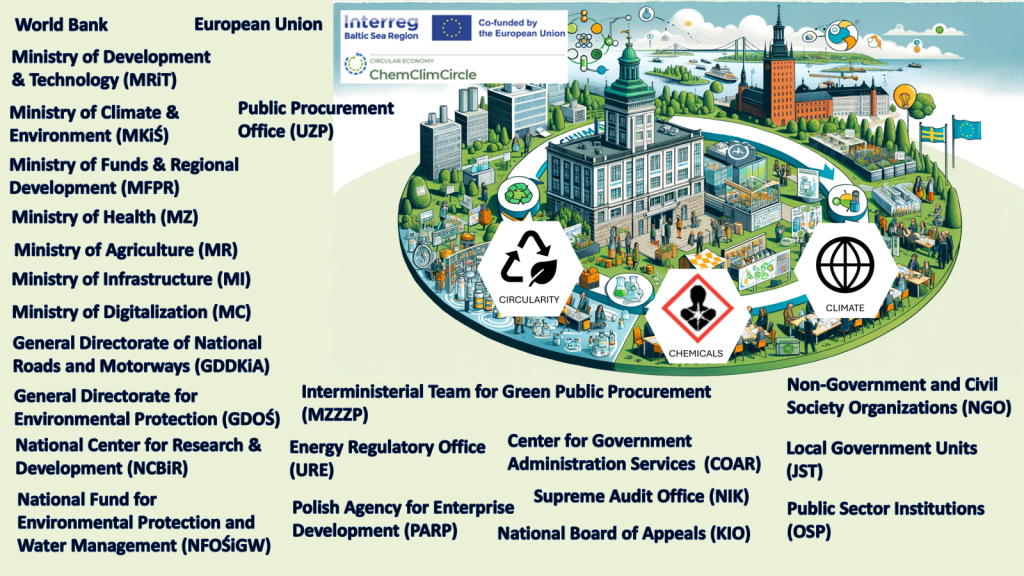
In Poland, public procurement is governed by a network of institutions, each with a specific role in regulating, managing, or implementing procurement procedures, including the promotion of Green Public Procurement (GPP). Green Public Procurement refers to public purchasing that takes into account environmental sustainability and in the ChemClimCircle project we focus on the criteria related to reducing Chemicals, minimizing Climate impact and promoting Circularity.
Key Challenges and Developments in GPP in Poland:
- Awareness and Capacity Building: Public authorities in Poland are working to increase awareness and expertise on GPP through training, workshops, and guidelines.
- GPP Implementation: The integration of GPP in Poland is still evolving, with some sectors (e.g., waste management, energy) seeing more success than others. The Public Procurement Office(UZP), Ministry of Development and Technology (MRiT) and local governments are focusing on creating more standard templates and criteria for green procurement.
- EU Influence: Poland’s green procurement policies are heavily influenced by the EU, especially with the growing emphasis on the European Green Deal. This is pushing national and local authorities to adopt more ambitious GPP strategies.
- Distribution of responsibilities among many institutional actors: In Poland there are many institutions that play more or less significant role in promoting and implementing GPP. Sometimes synergies may be a benefit of the system, however, shared responsibility may dilute the strength of the measures implemented.
Here is a map of key institutions involved in Public Procurement in Poland, with special attention to their role in fostering Green Public Procurement:
1. Ministry of Development and Technology (Ministerstwo Rozwoju i Technologii, MRiT)
- Role in Public Procurement: This ministry oversees national development strategies, including sustainable development and innovation policies. It coordinates the implementation of EU funds and procurement policies.
- Green Public Procurement: The ministry encourages GPP as part of Poland’s national strategy for sustainable development. It supports integrating eco-friendly solutions into public procurement by aligning national policies with EU goals on sustainability and climate change.
2. Public Procurement Office (Urząd Zamówień Publicznych, UZP)
- Role in Public Procurement: The Public Procurement Office (UZP) is the main governmental body responsible for the overall regulation, monitoring, and enforcement of public procurement laws and policies in Poland. It plays a crucial role in ensuring that public contracts are awarded fairly and transparently.
- Green Public Procurement: UZP promotes sustainable public procurement practices, including Green Public Procurement (GPP). The office provides guidance on how to integrate environmental criteria into tender procedures, offers training, and supports public authorities in adopting sustainable practices in procurement.
3. Ministry of Climate and Environment (Ministerstwo Klimatu i Środowiska, MKiŚ)
- Role in Public Procurement: The Ministry of Climate and Environment provides guidance and oversight on public procurement in sectors like energy and infrastructure, ensuring that these activities comply with national environmental regulations and sustainability strategies.
- Green Public Procurement: The Ministry promotes the integration of environmental criteria in public contracts, focusing on renewable energy, energy efficiency, and sustainable infrastructure to reduce the environmental impact of government procurement.
4. Ministry of Health (Ministerstwo Zdrowia, MZ)
- Rola w zamówieniach publicznych: Ministerstwo Zdrowia zarządza zamówieniami na potrzeby systemu opieki zdrowotnej, w tym na leki, sprzęt medyczny i infrastrukturę szpitalną.
- Zielone zamówienia publiczne: Ministerstwo dąży do wprowadzenia bardziej zrównoważonych praktyk w sektorze zdrowia, w tym zmniejszenia zużycia energii w szpitalach oraz stosowania ekologicznych materiałów w placówkach medycznych. Dąży także do ograniczenia zużycia jednorazowego plastiku w szpitalach oraz promowania bardziej ekologicznych technologii w opiece zdrowotnej.
5. Ministry of Funds and Regional Development (Ministerstwo Funduszy i Polityki Regionalnej, MFPR)
- Rola w zamówieniach publicznych: Ministerstwo Funduszy i Polityki Regionalnej nadzoruje wdrażanie funduszy unijnych i regionalnych, w tym duże projekty infrastrukturalne, budowlane oraz inwestycje wspierające rozwój regionalny.
- Zielone zamówienia publiczne: Ministerstwo aktywnie wspiera GPP poprzez kierowanie funduszy unijnych na projekty oparte na zrównoważonym rozwoju, w tym inwestycje w energię odnawialną, transport ekologiczny i modernizację infrastruktury pod kątem zwiększenia efektywności energetycznej.
6. Ministry of Agriculture (Ministerstwo Rolnictwa i Rozwoju Wsi, MRRW)
- Role in Public Procurement: The Ministry of Agriculture manages public procurement related to agricultural services, food safety, and rural development projects. This includes contracts for infrastructure supporting rural areas, agricultural technologies, and public food procurement programs.
- Green Public Procurement: The Ministry has a key role in promoting sustainable agricultural practices through GPP, focusing on the procurement of eco-friendly agricultural inputs, sustainable food production methods, and reducing the environmental impact of rural development projects. Their role is critical in driving the transition to sustainable farming, aligned with EU agricultural policies.
7. Ministry of Infrastructure (Ministerstwo Infrastruktury, MI)
- Role in Public Procurement: The Ministry of Infrastructure handles procurement related to transport infrastructure, such as roads, railways, ports, and public transportation systems. It is responsible for large-scale infrastructure projects, including public tenders for construction and maintenance.
- Green Public Procurement: GPP initiatives within the Ministry focus on reducing the environmental impact of infrastructure projects by incorporating sustainable construction materials, energy-efficient transportation solutions, and eco-friendly designs for public infrastructure. This aligns with EU standards for sustainable transport and climate goals, especially under the European Green Deal.
8. Ministry of Digital Affairs (Ministerstwo Cyfryzacji, MC)
- Role in Public Procurement: The Ministry oversees the procurement of digital technologies, IT infrastructure, and telecommunications systems for the public sector. This includes e-government services, digital security, and cloud services.
- Green Public Procurement: The Ministry promotes GPP by focusing on the procurement of energy-efficient IT systems, environmentally friendly data centers, and the reduction of e-waste. It also encourages the adoption of sustainable digital solutions in government services, such as paperless offices and low-energy consumption data storage systems.
9. General Directorate for National Roads and Motorways (Generalna Dyrekcja Dróg Krajowych i Autostrad, GDDKiA)
- Role in Public Procurement: GDDKiA is responsible for managing the construction, maintenance, and expansion of Poland’s national road infrastructure. It conducts large public tenders for road construction, repairs, and associated services.
- Green Public Procurement: GDDKiA increasingly focuses on GPP, prioritizing the use of eco-friendly road construction materials, energy-efficient lighting systems, and minimizing the environmental footprint of road construction projects. It is also involved in promoting sustainable transportation infrastructure like electric vehicle charging stations along highways.
10. General Directorate for Environmental Protection (Generalna Dyrekcja Ochrony Środowiska, GDOŚ)
- Role in Public Procurement: GDOŚ oversees procurement related to environmental conservation projects, biodiversity protection, and environmental impact assessments. It is responsible for projects that ensure compliance with national and EU environmental regulations.
- Green Public Procurement: GDOŚ plays a leading role in implementing GPP by integrating strict environmental standards in public tenders, focusing on nature conservation, sustainable land use, and environmentally responsible project execution. It ensures that all public procurement aligns with national environmental protection goals.
11. National Centre for Research and Development (Narodowe Centrum Badań i Rozwoju, NCBiR)
- Role in Public Procurement: NCBiR handles the procurement of research and innovation projects, funding research institutions, universities, and enterprises engaged in cutting-edge technologies. This includes research contracts and public tenders for technological innovation.
- Green Public Procurement: NCBiR promotes innovation in green technologies, funding projects that aim to reduce environmental impacts, improve energy efficiency, and develop renewable energy sources. Its GPP focus is on sustainable innovation, such as funding research on eco-friendly technologies and climate-resilient infrastructure.
12. The National Fund for Environmental Protection and Water Management (Narodowy Fundusz Ochrony Środowiska i Gospodarki Wodnej, NFOŚiGW)
- Role in Public Procurement: This organization manages environmental funds and provides financial support for environmental projects. It is responsible for environmental protection initiatives across Poland.
- Green Public Procurement: NFOŚiGW plays a supporting role in GPP by financing projects that include sustainable procurement practices, especially in sectors like water management, energy, and waste management. The fund encourages public entities to include green criteria in contracts.
13. The Energy Regulatory Office (Urząd Regulacji Energetyki, URE)
- Role in Public Procurement: This office regulates the energy market in Poland, overseeing electricity and gas sectors.
- Green Public Procurement: URE supports the inclusion of green energy requirements in public procurement, especially in energy-related contracts. They help public bodies meet the requirements for renewable energy sourcing and energy efficiency, key components of GPP.
14. The Polish Agency for Enterprise Development (Polska Agencja Rozwoju Przedsiębiorczości, PARP)
- Role in Public Procurement: PARP supports the development of small and medium-sized enterprises (SMEs) in Poland, including their participation in public procurement.
- Green Public Procurement: PARP promotes GPP by helping businesses develop green products and services that can be offered in public tenders. The agency also educates SMEs on how to meet green criteria to participate in eco-friendly procurement opportunities.
15. Supreme Audit Office (Najwyższa Izba Kontroli, NIK)
- Role in Public Procurement: NIK is responsible for auditing public institutions, including their public procurement practices.
- Green Public Procurement: As part of its audits, NIK ensures that public institutions follow both national and EU regulations on GPP. It assesses the integration of green criteria and monitors how sustainable procurement policies are applied in practice.
16. National Appeal Chamber (Krajowa Izba Odwoławcza, KIO)
- Role in Public Procurement: KIO is an independent institution that reviews appeals related to public procurement procedures. It ensures the legal correctness of procurement processes, resolves disputes, and ensures fair competition.
- Green Public Procurement: While KIO does not directly implement GPP, it plays an important role in upholding environmental regulations in public procurement processes. It ensures that any procurement-related disputes concerning environmental or green procurement criteria are fairly adjudicated, supporting the broader GPP goals.
17. Government Administration Service Centre (Centrum Obsługi Administracji Rządowej, COAR)
- Role in Public Procurement: COAR manages procurement for government offices, handling contracts for administrative services, office supplies, technology, and building management.
- Green Public Procurement: COAR implements GPP by focusing on sustainable office management, including the procurement of energy-efficient buildings, eco-friendly office supplies, and reduced energy consumption in administrative services. It aligns with government goals to create greener workplaces across public institutions.
18. Interministerial Team for Green Public Procurement (Międzyresortowy Zespół do spraw Zielonych Zamówień Publicznych, MZZZP)
- Role in Public Procurement: This team coordinates GPP initiatives across different ministries, ensuring that green public procurement strategies are integrated into national procurement policies.
- Green Public Procurement: The Interministerial Team promotes the adoption of green criteria in public tenders across all sectors, aligning them with EU sustainability goals. The team works to standardize GPP practices and ensure that ministries adopt eco-friendly procurement strategies, enhancing Poland’s efforts toward sustainability. Their role includes developing guidelines, providing training, and ensuring that green procurement is widely implemented in both national and local public procurement processes.
19. Local Government Units (Samorządy, JST)
- Role in Public Procurement: Local governments in Poland, such as municipalities and regional councils, are responsible for public procurement at the local level, particularly in areas like construction, transportation, and public services.
- Green Public Procurement: Local authorities are increasingly incorporating GPP into their procurement practices, especially in projects related to transportation, building energy efficiency, and waste management. Many local governments work with the Ministry of Development and UZP to align with national GPP strategies.
20. Public Sector Institutions (Organizacje Sektora Publicznego, OSP)
- Role in Public Procurement: Public Sector Institutionsin Poland, such as universities, museums and other not controlled by local authorities, are responsible for large portion of public procurement at the local level, particularly in areas like construction, transportation, and services.
- Green Public Procurement: Public Sector Institutionsare increasingly incorporating GPP into their procurement practices, especially in projects related to transportation, building energy efficiency, and waste management. Many public institutions work with the Ministry of Development, Ministry of Science, Ministry of Climate & Environment and UZP to incorporate GPP into their procurement strategies.
21. Environmental NGOs and Civil Society Organizations (Organizacje Pozarządowe i Społeczeństwo Obywatelskie, NGO)
- Role in Public Procurement: Although not formal government bodies, NGOs and civil society organizations often influence public procurement by lobbying for greener policies and practices.
- Green Public Procurement: These organizations advocate for stricter environmental standards in procurement processes and work with governmental bodies to ensure that GPP is a priority in national and local procurement strategies.
22. European Union (EU)
- Role in Public Procurement: Poland is a member of the EU, which plays a critical role in shaping public procurement regulations. EU directives, such as the 2014 Public Procurement Directives, influence Poland’s national procurement laws.
- Green Public Procurement: The EU sets targets and provides guidelines for GPP across member states, including Poland. EU funding programs, like those under the European Green Deal, often require green criteria in public procurement projects, especially when financing infrastructure, energy, and public transportation.
23. World Bank
- Role in Public Procurement: The World Bank supports public procurement through financing large-scale projects in infrastructure, education, and environmental protection. It provides guidelines and frameworks to ensure that procurement processes are transparent, competitive, and aligned with international best practices.
- Green Public Procurement: The World Bank plays a pivotal role in encouraging sustainable procurement in Poland by financing projects that integrate environmental sustainability. It promotes the use of GPP by offering technical assistance and resources for projects that focus on climate resilience, renewable energy, and sustainable development. Through its Green Procurement Framework, the World Bank supports the integration of eco-friendly practices into public tenders, particularly in large infrastructure and environmental projects.
In conclusion, Poland’s public procurement ecosystem involves several key institutions that manage, regulate, and promote GPP. The government’s focus on sustainability, combined with EU directives and funding incentives, is driving progress toward integrating environmental concerns into public contracts.
For more information about the ChemClimCircle project and how it can help, or how you can get involved fill in the contact form here, visit our website and follow us on social media. Let’s work together for a sustainable future! 🌍🌿🔄
#Sustainability #CircularEconomy #ClimateAction #ToxinFree #PublicProcurement #GreenFuture #ChemClimCircle

